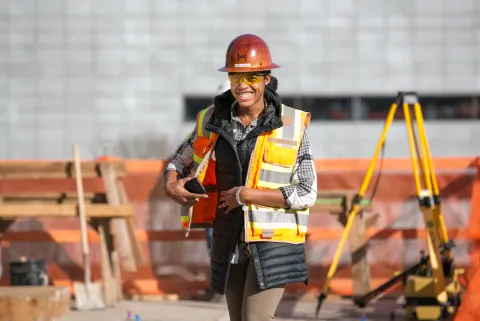Preparing the contracting community and workforce pipeline to build the new Burnside Bridge is critical to the success of the Earthquake Ready Burnside Bridge Project. The project will create thousands of jobs in Oregon between 2023 and 2030. Multnomah County is dedicated to employing a diverse construction workforce. Multnomah County is also committed to ensuring that this major capital project provides economic opportunities for disadvantaged business firms and a diverse workforce that represents our community. This will help support the development of local firms and benefit our local economy.

In late 2023, the County selected Burnside Bridge Partners, Joint Venture as its construction contractor to build the Earthquake Ready Burnside Bridge. Burnside Bridge Partners is a joint venture between three notable transportation and bridge construction firms. This includes Stacy and Witbeck, the employee-owned firm that built Portland’s streetcar system and multiple light rail lines, Traylor Bros, which has constructed more than 135 major bridges and American Bridge, which fabricated the original Burnside Bridge and built the Astoria Bridge over the Columbia River in its more than 120-year history.
Multnomah County is using the Construction Manager General Contractor (CM/GC) delivery method for this project in order to get early input and collaboration from the contractor. This is a construction management approach where the general contractor is hired during the Design Phase. This provides the engineering team the opportunity to work closely with the contractor to ensure a more efficient construction process.
Pre-construction activities are anticipated to start in 2026, with the main construction work starting in 2027, pending full funding of the project. If funding goals are met, a new Burnside Bridge could open as early as 2031.
Upcoming Milestones
The project is currently in the Design Phase. Here are some important upcoming milestones for contractors and workers:
- In mid-2024, the contractor will begin outreach activities with the contracting community to start recruiting a robust subcontracting team for the Construction Phase.
Resources
As we develop information for contractors and workers, watch this webpage for updates. Here are resources that may be of interest to local firms and those looking for employment opportunities:
- DocumentEQRB Project Labor Agreement (978.76 KB)
- County Purchasing Website: General information about how firms can do business with Multnomah County.
- MultCo Marketplace Supplier Portal: Learn about Multnomah County’s process for sharing purchasing opportunities and sign up to receive information about goods and services your firm can provide to the County. RFP’s for the Burnside Bridge project will be posted on the MultCo Purchasing and Bid Opportunities webpage.
- Earthquake Ready Burnside Bridge Updates: Sign up to receive updates about the County’s largest bridge project.
- Oregon Bureau of Labor and Industries Apprenticeships Program
- State-approved Pre-Apprenticeship Programs in Oregon, including these programs in the Portland area that have been involved with Multnomah County construction projects:
How your firm can prepare now for work on this project
- Obtain Oregon COBID Certification and be current
- Ensure licenses and certifications are current
- Ensure BOLI requirements are met (i.e.; registration as training agents)
- Build relationships with pre-apprenticeship organizations to build a diverse workforce
- Build relationships with other COBID-certified firms as possible subcontracting opportunities
- Review the County’s Workforce Training & Hiring Program requirements
Multnomah County policy supports diversity in contracting and workforce development
Multnomah County has an adopted policy (60-0020) stating:
(1) It is the intent of Multnomah County to provide opportunities for all segments of the business population to participate in Multnomah County contracting opportunities.
(2) Multnomah County has a compelling governmental interest in prohibiting discrimination in programs, activities, services, benefits and employment whether carried out by the County itself or through a Contractor with whom the County arranges to carry out its programs and activities.
(3) It is in the best interest of Multnomah County to promote and expand a thriving, diverse, well-trained workforce in the construction trades and to have diverse and thriving small businesses in our community.
(4) It is the policy of the County that each Construction Project (as defined in Rule 60-0060) shall benefit the growth and sustainability of a diverse local workforce and shall support the advancement of firms in the fields of construction-related professional services or contracting that have been certified by the Oregon Certification Office for Business Inclusion and Diversity (COBID-Certified Firms).
Multnomah County's values and track record
Multnomah County has a history of supporting a diverse workforce and contractor community on its capital projects. The recent Central Courthouse project contracted 34% of the total contract budget to disadvantaged firms. Thirty percent of the work hours were performed by apprentices and 28% of all work was performed by minority males and 10% was performed by women.
On the Sellwood Bridge Replacement project, 20% of the total construction contract went to disadvantaged firms, while 28% of the work was performed by minorities and 13% by women.
